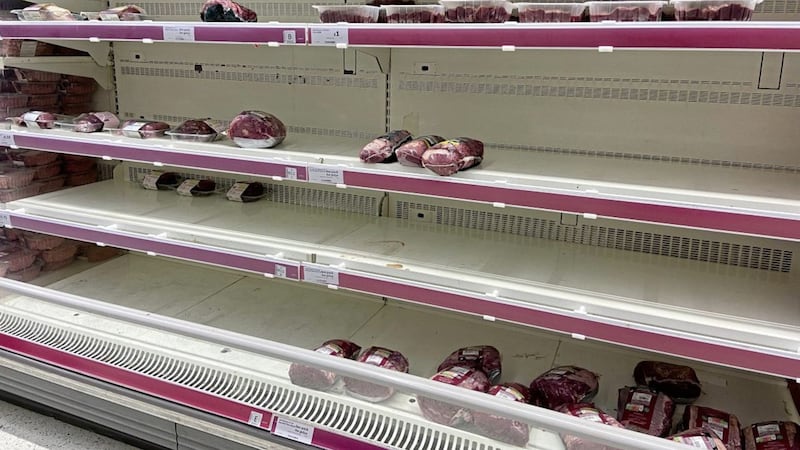Supermarkets in Northern Ireland will face fresh shortages on the shelves unless the EU is prepared to extend the "grace period" in the Brexit trade deal, retailers have warned.
British Retail Consortium director Andrew Opie said the problems which had resulted in a shortage of some food products following the end of the Brexit transition period on December 31 had largely been overcome.
But giving evidence to the Commons Brexit Committee, he said there could be fresh difficulties in April when a series of exemptions in the trade deal on goods being moved to Northern Ireland from Great Britain comes to an end.
"If we do not find a workable solution for retailers in the next couple of months we do face significant disruption in Northern Ireland," he said.
Mr Opie said that supermarkets which exported to the Republic of Ireland had found the system was "unworkable" as far as their supply chains were concerned.
"That is why we need to think about Northern Ireland. We should not just be trying to apply the same processes that apply to the EU into Great Britain-Northern Ireland," he said.
"Sending a lasagne from Great Britain to the Republic of Ireland is so complicated. You have to have authorisation going up through the chain, the vet at the end has to sign it off and he has to see all the authorisations."
Mr Opie also issued a warning over disruption to goods crossing the Channel, saying "it will get worse before it gets better".
He said he is on watch for any impact this week and onwards, with British businesses "still not 100% prepared" for the changes as the French step up customs checks.
"So we are anticipating problems. We're hoping that they will be relatively minor and consumers don't notice a difference," Mr Opie told the MPs.
"This is our peak import season and I couldn't stress this is probably the worst time of the year to try and manage disruption on the short straits."
Controls on goods moving to Northern Ireland from the rest of the EU are required under the terms of the deal agreed by Boris Johnson on Christmas Eve in order to ensure there is no return to a hard border with the Republic.
Food and Drink Federation chief executive Ian Wright warned that without changes to the deals, the industry would have to rethink its all its supply routes, leading to increased costs and delays.
"Unless the deal changes in some material way we are going to see the re-engineering of almost all the EU-UK and GB-NI supply chains over the next six months," he said.
He said that one international supplier had found that the paperwork for a consignment moving from the UK to the EU which would normally have taken three hours to complete had so far taken five days - and they were still working on it.
Mr Wright also expressed concern about the potential for delays at the Channel ports as the numbers of lorries making the crossing picked up over the coming months.
"It will get worse. Currently volumes across the short straits are at about 2,000 lorries. They should be around 10,000. So the opportunity for the scale of concerns to rise is huge," he said.
Meanwhile, DUP MP Jeffrey Donaldson said supermarkets will face a "cliff-edge" at the end of March unless a grace period where EU certification rules are relaxed is extended.
Responding to Cabinet Office minister Michael Gove, Sir Jeffrey told the Commons: "I have to say to him that perhaps the difficulties being encountered by Northern Ireland consumers and businesses are much greater than maybe he recognises."
He added: "We need immediate intervention on this matter. It is important for our economy. It is impacting on the economy of Northern Ireland and it is resulting, in some instances, in a diversion of trade.
"So, we do need steps taken to address what is now becoming a cliff-edge at the end of March for our supermarkets and others, and I welcome what the minister has said in terms of the ongoing discussions, but we need an assurance that this is going to be resolved before the end of March or that the grace period is extended further."
Read more:Supermarkets call for urgent intervention over Northern Ireland food supplies
Mr Gove added: "Nonetheless the new processes that the Protocol asks of business moving goods from GB to NI do require the government to do more. We're working with companies across GB to help them understand the new requirements for moving goods and the extent of government support includes the trader support service."
He added: "Yet we know that still more needs to be done, that's why we're stepping up direct engagement with suppliers to ensure that they have access to the real-time guidance that they need, and we're also working closely with industry to address specific problems moving mixed food loads from GB to NI through the process known as groupage.
"In the coming days, the government will issue new guidance on the practical mitigations that have been developed with industry to enable this important practice to continue and to support hauliers and suppliers."
Movements via Dublin port, he said, "are substantially lower than normal and so we have to intensify our engagement with the Irish authorities".








